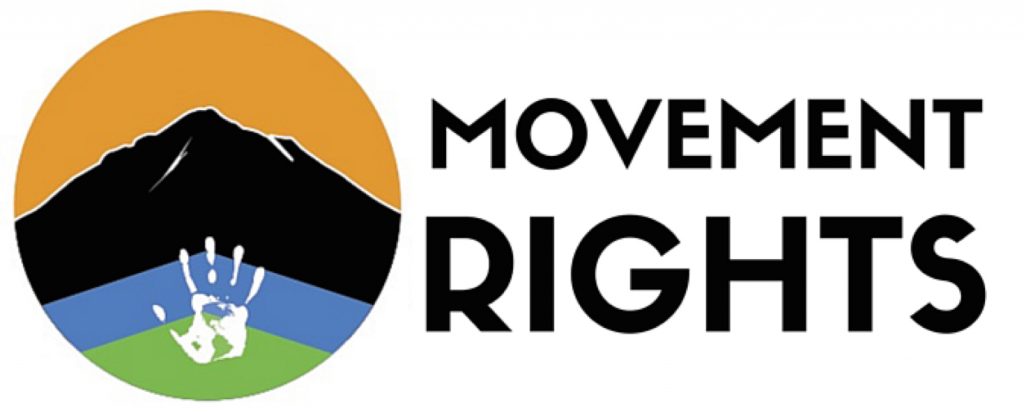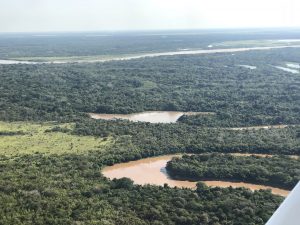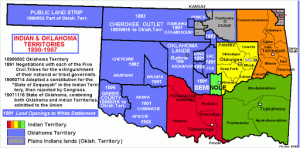By Shannon Biggs & Pennie Opal Plant, co-founders, Movement Rights
The year 2021 marked many changes. COVID-19 continued to shift the landscape of when, where and how we could respond to the climate crisis and the need for real systemic change. Despite the ongoing uncertainty, Movement Rights was able to travel to critical actions locally nationally and internationally, shift to digital organizing and media when the world went back into lockdown. We continued to raise funds for Indigenous communities in need of masks and other COVID protection, and advance plans for the work ahead with new partners and old friends. We are excited to share some highlights photos and links of our 2021 year in action, as well as share some a peek into the year 2022:
 Advancing Rights of Rivers & Indigenous Women’s leadership
Advancing Rights of Rivers & Indigenous Women’s leadership
Many Indigenous cultures recognize that women have a special relationship with water. After all, we are all born in water carried by our mothers. For the Ponca tribe, rivers are themselves considered sacred feminine entities. Since the beginning of time the Ponca hereditary Women’s Society, Pa’thata, have been the keepers of the Waters. With support and participation from Movement Rights, on Mother’s Day, May 9, 2021 the Pa’thata held their first Rights of the Rivers ceremony at the Ponca powwow grounds. Over 100 people from the Ponca and regional tribes gathered for the event, dozens of whom brought water from their own sacred rivers, including the Missouri River, and even Aotearoa’s Whanganui River. Women lined up in prayer as they added their water to the shared buckets which generations of Pa’thata took to join with the Arkansas and Salt Fork Rivers.
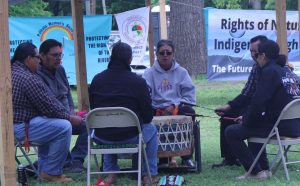
Rights of Nature is not just a legal shift, it is a cultural one. This ceremony was the first step of many that will see Indigenous women joining together along rivers to build cultural and legal Rights of Rivers guardianship. The Mother’s Day ceremony was significant, marking the beginning of the protection of the rivers’ rights. Not just for the Ponca, but among the many tribes along the Rivers’ journey, as well as up to the original homelands of the Ponca tribe along the Missouri River, near Standing Rock. In the year ahead our goal is to organize with other regional tribes to stand with the Pa’thata Women’s Society, and strengthen the anticipated Ponca’s legal recognition of the rivers as holistic ancestors that own themselves. In the year ahead Movement Rights will support the Pa’thata and other Indigenous Womens’ societies through a series of collaborative activities including women-led Intertribal Rights of Nature Forums to advance the Rights of Rivers and create systems of water protection based on the guardianship of Indigenous women.
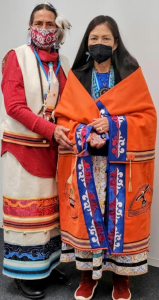
Talking Rights of Nature and Indigenous Perspectives to the Biden Administration
As the Biden administration prepared to take office, we worked with Ponca elder and Movement Rights Board member, Casey Camp Horinek to help share her perspective and demand a powerful shift from previous administrations’ policies. In January she wrote an OPED in U.K.’s The Independent, and a Daily Kos article, Dear President Biden, An Indigenous Perspective on your Inauguration that begins with, “While we celebrate the end of pipelines as your administration begins, I must acknowledge that the ink of your pen on these executive orders has come from the lifeblood of the Original Peoples, and our allies over many years. The caretaking of the Earth and Sky is in our hands, for humans are the only species who have defied the laws of Nature in a quest to conquer and own them. We must not only recognize the rights of humans to a clean environment, but the Rights of Nature itself—to evolve, thrive and continue its vital cycles—the Sacred Creation of which humans are only a small part.”
Upholding Indigenous Rights has never been more important for humanity. Indigenous peoples are global leaders of many green movements, including the Rights of Nature. During the UN Climate Negotiations (COP 26) in Glasgow, Casey had the opportunity to speak directly with Deb Haaland, the first Indigenous Secretary of the Interior, and convey the importance of supporting Rights of Nature within the Department of the Interior, which includes the Bureau of Indian Affairs. Through her work in cooperation with the Global Indigenous Council she helped ensure Rights of Nature text was inserted into the Wolf Treaty they presented to Secretary Haaland. The treaty would reverse Trump administration policies that threaten wolf populations and undermines tribal treaty rights and sovereignty.

#BuildBackFossilFree Project
We have a short window of time to wake up people and politicians to the fact that we cannot stop the worst impacts of climate change if we don’t end the fossil fuel era. Launched in January 2021, Movement Rights is proud to be on the steering committee of this coalition of hundreds of Indigenous, fossil fuel frontline communities, local state and national climate justice organizations. Led by Black, Indigenous, People of Color and grassroots communities living on the frontlines of fossil fuel projects, Build Back Fossil Free is calling on the Biden Administration to declare a climate state of emergency, and stop fossil fuel projects that are the primary source of catastrophic climate change. A big part of that is lifting up grassroots fossil fuel fights (and solutions, including Rights of Nature) across the U.S.—from oil lease sale actions to pipeline fights, to fracking and more. Throughout the summer we worked collectively toward one big shared week of action in October 2021—the People VS Fossil Fuels that brought the climate justice movement to Washington D.C.
 People VS Fossil Fuels: the Climate Justice Movement Went to DC
People VS Fossil Fuels: the Climate Justice Movement Went to DC
Beginning on Indigenous Peoples Day, October 11, 2021, by the thousands we came to the so-called seats of power—the White House, the US Capitol, the Department of the Interior and the Bureau of Indian Affairs. At the invitation of and led by communities on the frontlines of fossil fuel destruction, we came to demand the Biden Administration call for a climate emergency and take action. Organized by #BuildBackFossilFree, Movement Rights was proud to be part of the planning committee for the People VS Fossil Fuels week of action. Movement Rights’ co-founder Shannon Biggs and board member Casey Camp Horinek were among over 650 people arrested in Washington DC in this historic action we heard powerful testimony from the frontlines. In total, 655 people were arrested, 3 million tweets were logged, and hundreds of national and global media stories were filed in the weeks before the Biden Administration left for Glasgow to attend the UN COP 26 Climate Summit. But showing up at Biden’s front door wasn’t about expecting instant radical change from the “halls of power.” It was and is about showcasing where power really resides, and where solutions really exist. Grassroots movements have historically led politicians to justice, and this time is no different.

International Rights of Nature Tribunal, Glasgow, Scotland
Throughout 2021, Movement Rights worked with global partners toward the 5th International Rights of Nature Tribunal (November 3 & 4) as part of our work through the Global Alliance for the Rights of Nature (GARN). These International tribunals have been historically held concurrently with the UN COP process, to showcase the difference in the approaches of the UN’s financialization of nature mode, and the Rights of Nature in addressing climate issues. Due to COVID restrictions, we created a hybrid event. Many of our colleagues were in Glasgow in person, including board members Casey Camp Horinek and Tom Goldtooth, while many others were online. The Tribunal judges heard two cases in Glasgow, False solutions to the climate change crisis; and the Amazon, a threatened living entity and after deliberations, the judges rendered powerful verdicts. The tribunals are an open invitation to step into the world of system change: human laws that reflect the laws of the natural world, as it should be, and as it could be.
The failure of the 26th annual gathering of the international political elites
and delegates inside the UN convening was not surprising. Often referred to as the “international community’s last chance to truly address the fate of the planet” the UN process was rife with lobbyists for business as usual. More than 500 fossil fuel “delegates” present at the COP 26 negotiations, larger than either the entire number of Indigenous delegates, or delegates from the 5 most climate impacted countries on Earth. As a result, we believe the growth of Rights of Nature and other climate justice grassroots movements will continue to be the driving force for the system change needed to save humanity. Through the growth of GARN’s regional and thematic “hubs” other incredible activities and regional tribunals were held in 2021, and there are many ways to get involved.
 Calling out so-called “Nature Based Solutions” & Climate Chaos Profiteers
Calling out so-called “Nature Based Solutions” & Climate Chaos Profiteers
As Movement Rights board member and global leader on water, Maude Barlow, said recently, “I will remind us that of the 100 largest economies in the world, 69 are still transnational corporations and 31 are countries… biodiversity is being reinvented basically as a market model.” Since our inception, Movement Rights has always sounded the alarm about the threats of the “financialization of Nature” and the various climate schemes supported by Wall Street and the UN Climate process. At COP 26, the Glasgow Financial Alliance (banks, asset managers, pension, insurance funds, etc.) pledged $130 trillion toward “nature-based solutions” and “net zero” two of the latest and slickest marketing terms for the same old climate Ponzi schemes that allow polluters to continue polluting by buying carbon credits from forests and Indigenous forest communities. Wall Street is now speculating on “water futures” for drought threatened places including California, treating water as a tradable commodity on the NASDAQ, rather than a source of life. In 2021, Movement Rights co-founder, Pennie Opal Plant contributed a chapter to the NDN Collective’s book, Required Reading, entitled, Magical Realism Will not Save us: Dispelling the Myth of Nature Based Solutions, Carbon Trading and Climate Capitalism. We also shared our analysis on the Red and Green Podcast, “Mother Earth does not Negotiate,” and other forums. Through our work as part of GARN, we participated in putting forward the Rights of Nature Tribunal in Glasgow, including a case on the Financialization of Nature. The Rights of Nature community has a sharp critique of carbon trading by any name—including the positive sounding “Nature-based solutions.” We will continue this work in 2022 through a series of webinars, reports, strategy meetings and street actions that articulate not only what Rights of Nature is for, but what we must oppose in order to preserve a livable planet.

In the News and Broadening our Message through our Allies’ Incredible Work
In addition to the hundreds of articles filed on the People VS Fossil Free week of Action from the Washington Post to as far away as the Guam Daily Post—Movement Rights was featured in dozens of news articles on the Rights of Nature in 2021. Some of our favorite news highlights in the year included a feature in YES! Magazine; UK’s Independent; Daily Kos, Red & Green Podcast; The Guardian; and Pennie Opal Plant’s opinion piece “Mother Earth Does Not Negotiate,” in Native News Online. We were also excited to be featured in the acknowledgements and throughout their well-researched book The Politics of Rights of Nature by friends Pamela Martin and Craig Kauffman. According to their research, to date 27 countries have already or are considering adopting Rights of Nature legal provisions in 2021!
 We were also thrilled to be asked to share our work and perspectives in many of our allies podcasts and webinars throughout the year: We presented at international and national symposia and webinars throughout the year including Women’s Earth and Climate Action Network’s amazing Global Women’s Assembly (at 2:45 mark); We were also honored to participate in an extraordinary panel discussion hosted by nuclear expert and friend, Cynthia Lazaroff and Nuclear Wakeup Call’s panel, “Indigenous Wisdom, the Nuclear Ban Treaty & Activism to Transform Our Nuclear Legacy,” Pennie Opal Plant joined Bill McKibben and others on the panel, Co-generational Activism: How to fight for change in your Third Act and Vision Maker’s webinar, The Indigenous Rights of Nature Movement panel. And soooo much more. These are not one-off events for us—while COVID has continued to limit many in-person events, we have worked to ensure these shared spaces are also opportunities to network and build bridges between movements, strategies and ideas. We look forward to collaborations and next steps in the year ahead—many of those conversations are already underway.
We were also thrilled to be asked to share our work and perspectives in many of our allies podcasts and webinars throughout the year: We presented at international and national symposia and webinars throughout the year including Women’s Earth and Climate Action Network’s amazing Global Women’s Assembly (at 2:45 mark); We were also honored to participate in an extraordinary panel discussion hosted by nuclear expert and friend, Cynthia Lazaroff and Nuclear Wakeup Call’s panel, “Indigenous Wisdom, the Nuclear Ban Treaty & Activism to Transform Our Nuclear Legacy,” Pennie Opal Plant joined Bill McKibben and others on the panel, Co-generational Activism: How to fight for change in your Third Act and Vision Maker’s webinar, The Indigenous Rights of Nature Movement panel. And soooo much more. These are not one-off events for us—while COVID has continued to limit many in-person events, we have worked to ensure these shared spaces are also opportunities to network and build bridges between movements, strategies and ideas. We look forward to collaborations and next steps in the year ahead—many of those conversations are already underway.

Our Webinars & Intertribal Movement Building
Our webinar series and Intertribal Rights of Nature (IRON) work educated thousands, became part of school and university curriculums around the world, helped share how Rights of Nature fits with other critical movements for change—including the Indigenous LANDBACK movement, and brought Indigenous peoples together to share their experiences. In 2021 Rights of Nature grew to include laws in over 20 nations including First Nations (Canada) protection of rivers; the first Rights of Nature lawsuit was filed in Tribal court to protect the Rights of Manoomin Rice and stop the Line 3 pipeline. Laying the ground for IRON Forums 2022: Since the Ponca passed the first Rights of Nature tribal law in 2017, several tribes in US/Canada have recognized the Rights of Nature, with many more interested in learning how this might work to protect rivers that pass through several tribal nations and states. We held several strategic conversations in 2021 and are rolling out more IRON Forums to explore how tribes might work together collectively to protect watersheds/river systems in the US, beginning in February 2022.
 Statement Shopping! Wear your Support While Giving to Movement Rights!
Statement Shopping! Wear your Support While Giving to Movement Rights!
We invite you to check out our new online store. Take a look at our awesome designs at weRnature-earth today and explore gifts with meaning for yourself and others. Products include greeting cards, baby and adult clothing, hats, mugs, clocks, phone cases, water bottles and more.
We would love to know which designs and products you like! Let us know by ordering or “liking” designs and products, or reaching out to us by email. We will be adding new designs and products throughout the year. All sales proceeds go to support Movement Rights’ work for Rights of Nature.
There is much to do in 2022. We can’t do it without You.
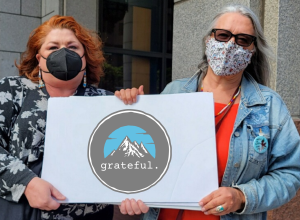 Movement Rights is intentionally small, which helps us respond to urgent needs quickly and put donations to work on the ground. We are an intentionally Indigenous and women-led organization, because we recognize the critical role Indigenous wisdom and women’s leadership has to play in shifting the narrative and rewriting the future. We are also very lean—less than 10% of our budget is spent on administrative overhead, so that the funds we raise from individuals and foundations is spent on the important work we do. This annual report provides not just a look back on our work in 2021, but glimpses into the work ahead in 2022. We’re proud of what we’ve accomplished and hope you will join us by supporting this critical work for climate justice, the Rights of Indigenous Peoples and the Rights of Nature by making a tax deductible donation today, including becoming a monthly supporter for as little as $10 a month. We thank you for making our work possible.
Movement Rights is intentionally small, which helps us respond to urgent needs quickly and put donations to work on the ground. We are an intentionally Indigenous and women-led organization, because we recognize the critical role Indigenous wisdom and women’s leadership has to play in shifting the narrative and rewriting the future. We are also very lean—less than 10% of our budget is spent on administrative overhead, so that the funds we raise from individuals and foundations is spent on the important work we do. This annual report provides not just a look back on our work in 2021, but glimpses into the work ahead in 2022. We’re proud of what we’ve accomplished and hope you will join us by supporting this critical work for climate justice, the Rights of Indigenous Peoples and the Rights of Nature by making a tax deductible donation today, including becoming a monthly supporter for as little as $10 a month. We thank you for making our work possible.
